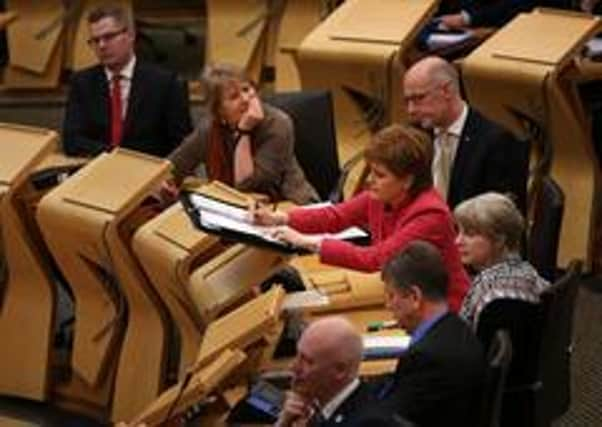How will Holyrood and Westminster continue to hold governments to account during coronavirus lockdown?


THIS should be the Easter holidays when families can take a break and hope for warmer weather to coincide with the first weeks of spring. It usually means long queues at airports, busy trains and traffic jams on the motorways.
But this year is different. Schools have already been shut for a couple of weeks; millions of people are off work through no choice of their own, many have lost their jobs; trains and planes are virtually at a standstill and the streets deserted.
Advertisement
Hide AdAdvertisement
Hide AdNormal life is on hold until coronavirus is brought under control.
Aside from the now former Chief Medical Officer breaching her own guidelines, people are by and large accepting of the Government’s restrictions, recognising the seriousness of the situation and the need for joint action to combat the virus.
But there is rightly a concern not to let things go unchallenged and a concern that special powers should not go too far.
Police have been criticised for over-zealous enforcement of government guidance, tipping over barbecues or stopping cars to find out where people are driving to.
Advertisement
Hide AdAdvertisement
Hide AdAnd emergency legislation has seen unprecedented powers being brought in. That nearly included the scrapping of jury trials during the lockdown - until an outcry persuaded the Scottish Government to drop the plan, though a revised scheme could still be brought back.
And there are important issues on which ministers need to be held to account, like the shortages of personal protective equipment and ventilators and the whole question of testing.
But the lockdown makes scrutiny more difficult. And since it’s Easter both Holyrood and Westminster are now in recess - the Commons brought the start of their break forward to stop MPs infecting each other and members of staff.
Depending on how the crisis progresses, there could also be questions over whether, when or how they return afterwards.
Advertisement
Hide AdAdvertisement
Hide AdMPs and MSPs could both end up meeting one or two days a week, sitting well apart in line with social distancing guidelines.
There has been talk in both parliaments of the importance of scrutiny being maintained and the possibility of MPs and MSPs holding virtual meetings of committees or Skype-style question times.
Ed Davey, the acting Lib Dem leader at Westminster, has made the point that of the current crisis was something other than an infectious virus, parliament would have been recalled rather than going on recess.
More than 100 opposition MPs have written to the clerk of the Commons, urging some sort of digital parliament, while at the Scottish Parliament Constitution Secretary Mike Russell has warned creating a virtual version of Holyrood would require “a huge technological step”.
Advertisement
Hide AdAdvertisement
Hide AdNo doubt there are all sorts of difficulties to be overcome but while less urgent business will inevitably be postponed, there is essential work for both parliaments to do - passing urgent legislation, approving spending and perhaps most importantly questioning the Government - and in this day and age it is surely only right that technology is harnessed to make sure all that happens.
Westminster is sometimes seen as a bastion of archaic ways and outdated procedures. As a younger parliament which prides itself on its openness and innovation, Holyrood may be better placed to lead the way.
Comment Guidelines
National World encourages reader discussion on our stories. User feedback, insights and back-and-forth exchanges add a rich layer of context to reporting. Please review our Community Guidelines before commenting.